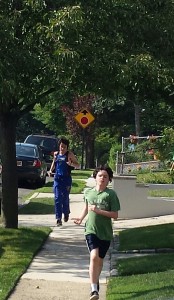By Maria Dwyer, SafeMinds Board Member
I saw a baby at the park yesterday chewing on an iPhone.
She couldn’t have been more than six months old but she was already enjoying today’s modern technologies.
It’s become socially acceptable for parents to hand their babies smart phones. We even have potty chairs with screens built-in and bouncy chair iPads for babies too young to walk. America’s kids today (and their parents) are so addicted to technology (Facebook, anyone?) that they’d often rather stay home and play Minecraft than spend time outside.
I have nothing against Minecraft, but the fact is today’s kids, with and without autism, are so addicted to technology that it’s compromising their health and well-being, affecting their attention spans, and keeping them from doing enough exercise and getting enough vitamin D.
Shout it from the rooftops: Our kids (and grown-ups too) need to spend more time outside!

Outdoor activities are especially important for kids with autism. Children with ASD detox through exercise—we all do. Exercise oxygenates your blood, raises your endorphin levels, and strengthens your muscle tone. You knew that already. But maybe you didn’t know that every time you exhale, you naturally detoxify your body, like with sweating and going to the bathroom.
When my son Colin was younger he loved to jump on trampolines and beds (you’re welcome Overstock.com and Sleepy’s for all the repeat business). Now that he’s 15, we’ve found some great sports he enjoys. He takes lessons with a local tennis pro named George who has become his friend. While it was incredibly frustrating for him at first because Colin has autism and has trouble following directions and is easily distracted, it’s amazing to see how quickly he has progressed. It’s also great to start a game of catch, which can lead into a backyard baseball game.
My older son Shane, who does not have ASD, runs track and competes on the state level. This summer Shane has been taking Colin on daily runs. I don’t tell them how happy it makes me (teenagers), but I know when they go running together Colin and Shane are both sweating out toxins and enjoying a sibling activity that helps them bond. Colin is so proud of himself for being able to run with his big brother. I’m so proud of him too.

We can all agree we need our kids to sweat. Here are ten ideas of how to make that happen:

1) Go running: Lace up your running shoes and lace up your child’s. Do this activity together. It doesn’t matter if you run 19-minute miles. You’re out there doing it.
2) Go bowling: This can take some practice since bowling alleys can be very loud, which is a problem for a lot of our ASD kids, but once you adjust, there’s nothing better than swinging a big black ball at a bunch of little white pins to build confidence and excitement.
3) Go swimming: We know that pool chemicals are not good for human health, so try to swim in the ocean or a lake. Teaching a child with autism to swim allows them to work all the muscles in the body, which is stimulating for their brains.
4) Go horseback riding: Horseback riding is great for kids on the spectrum because many of our kids have low muscle tone that affects their coordination and strength. Horseback riding helps improve balance and motor control and is a wonderful bonding experience!
5) Ride a scooter: Learning to ride a bike is a big step in all kids’ lives, but often times takes lots of work for kids on the spectrum. We found that starting with a scooter helped Colin develop good hand-eye coordination, balance, and steering skills, plus he found using a scooter fun and easy to navigate on city streets and in stores (sorry Target)!
6) Rock climb: This is an amazing activity for kids who crave movement and sensory input like Colin. It definitely increases self-esteem and is super safe if you do it at a facility. Colin loves to rock climb in Central Park too!
7) Ride a bicycle:Riding a bike is a huge accomplishment and allows our kids to develop a sense of independence. My husband Tim takes Colin on 5-mile bike rides. He brings a rope that he can tie to Colin’s bike to tow him back if he’s too exhausted to pedal … Works great!
8) Go for a hike: Our kids benefit from communing with nature, all kids do. We live in the city but close to the Alley Pond Environmental Center. We take long walks and see lots of city wildlife–yes that includes pigeons! I had a friend whose son suffered from terrible constipation. When she took him for a walk in a nearby forest, he found relief. She believed being around trees had a profound effect on his mind and body.
9) Jump on a trampoline: We have a small trampoline in the living room with a handle bar. Both teenagers jump on it constantly while watching TV. I’ve had to replace it three times. Both small and big trampolines are a fantastic sensory experience and intense workout!
10) Take an outdoor class: at the YMCA or your local gym. Colin takes special needs soccer and basketball at our local YMCA. Each kid is paired with a typical shadow who helps keep him on task. It’s really nice to see the kids playing a structured game and following rules.
Summer is a time to sweat, but there are also other great ways to detox. I’ll be sharing my top 10 list for ways to detox outside of sports that have worked really well for our family (I know you want to read it). That post will come out soon, so check back here at SafeMinds.
Now it’s your turn. What’s your favorite summer family sport? What has your child on the spectrum overcome to be able to do physical activities?
 Maria Dwyer is a Safeminds Board Member and Communications Committee Chairperson. She is a TV Sales Strategist at Martha Stewart Living and lives in New York City with her husband Tim and four sons.
Maria Dwyer is a Safeminds Board Member and Communications Committee Chairperson. She is a TV Sales Strategist at Martha Stewart Living and lives in New York City with her husband Tim and four sons.
Related posts:
Summer Fun Without the Toxic Chemicals
What Happens When Autistic Children Age Out?


